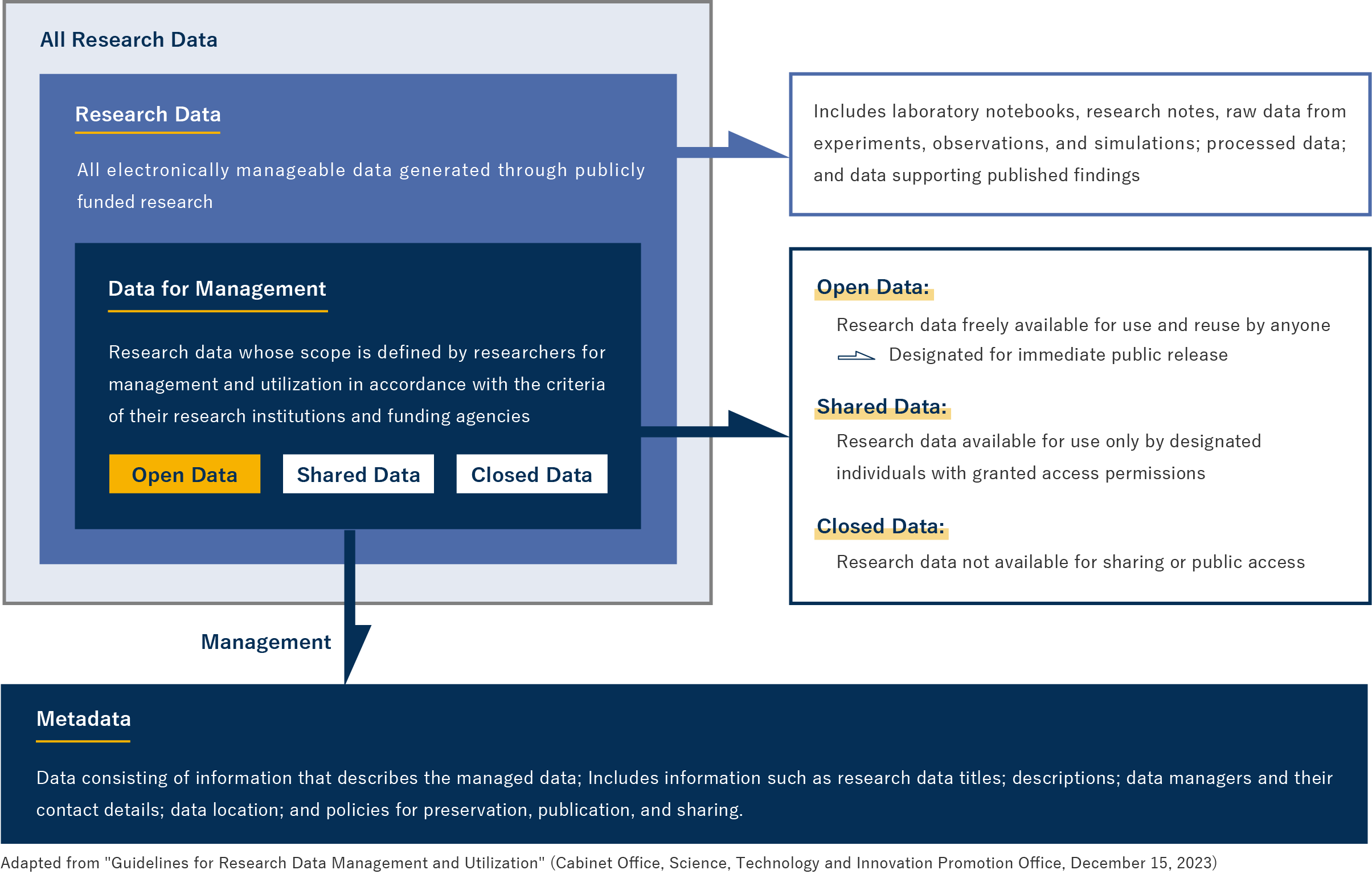- HOME
- Research Data Utilization
Research Data Utilization
What is Research Data?

Research data refers to 1) information collected or generated during or as a result of research, 2) materials used to verify hypotheses or provide evidence for conclusions, and 3) records used to verify the accuracy of research results. Research data includes not only electronic data but also paper-based information and physical objects (such as synthesized materials, archaeological artifacts, etc.). Research data comes in various formats, from text to 3D models, and includes diverse records such as research notes, photographs, and audio recordings.
Significance of Research Data Management and Publication
For researchers, managing research data offers the following benefits and significance:

- Proper management of research data allows verification that your research has been conducted correctly, which helps protect your research by enabling you to demonstrate its integrity. As commercial publishers begin to commercialize research data following the trend in academic journals, there is an increasing need to counter this trend. Maintaining control over your data both protects the data itself and safeguards your research activities.
- Establishing basic rules for research data management and properly preserving, using, and sharing data at the individual researcher, laboratory, and research project levels leads to more efficient research.
- Publishing research data and making it available to many users increases the value of the research itself.
Important Considerations in Research Data Management, Retention, and Publication
Creating a Data Management Plan
Research funding agencies are increasingly requiring the submission of data management plans (DMPs) to ensure appropriate data management throughout and after research projects. For KAKENHI (Grants-in-Aid for Scientific Research), starting from fiscal year 2024, researchers are required to create DMPs for all research categories at the start of their research. (At present, submission of the DMP is not required.)
*Note: Some JST-funded research projects already require DMP submission.
Research Integrity
Research data management, preservation, and publication are essential for addressing research misconduct and ensuring research soundness and transparency. Nagoya Institute of Technology has established several governance frameworks: our 2016 “Guidelines for Proper Handling of Research Information and Data” mandate a 10-year retention period for data supporting published papers. This was followed by “Guidelines for Research Data Management” detailing specific storage protocols. Moreover, on March 22, 2023, we introduced the “Nagoya Institute of Technology Academic Data Policy” to define institutional principles for managing, publishing, and utilizing academic data.
Disclosure of Supporting Data
Many academic journals now require research data to be stored and shared through trusted repositories as part of their data policies.
Making Research Data Open Access
The global shift toward open science has intensified societal expectations for accessible research data. The 6th Science, Technology, and Innovation Basic Plan” (Cabinet decision, March 26, 2021) aims to accelerate data-driven research and foster research activities involving diverse stakeholders, including citizens, through research data management and utilization based on open-and-closed strategies.*
*What is an open-and-closed strategy?
In the context of research data, an “open-and-closed strategy” refers to a strategic approach that distinguishes between data that should be made public and data that should remain closed.
(Source) University ICT Promotion Council “Guidelines for Developing Research Data Policies at Universities” (July 1, 2021)

Nagoya Institute of Technology Academic Data Policy
On March 22, 2023, we introduced the “Nagoya Institute of Technology Academic Data Policy” to define institutional principles for managing, publishing, and utilizing academic data.
- Nagoya Institute of Technology Academic Data Policy
- Nagoya Institute of Technology Academic Data Policy Guidelines
Data Management Plans (DMPs)
A Data Management Plan (hereinafter referred to as "DMP") is a plan that defines how research data will be handled in a research project, etc. Specifically, it will describe the type and format of data, access and sharing policies, and how the data will be stored.
Many funding agencies overseas require submission of a DMP when applying for research grants.
Here, the example of Grants-in-Aid for Scientific Research (Kakenhi) is shown, which will require to create DMP when applying for grants for all the categories from FY2024.
- Pre-Research Phase:
- Develop your data management plan when starting your research, using the provided DMP templates as a reference.
Note: KAKENHI grants do not currently require DMP submission. - During Research:
- Conduct your research following appropriate data management practices as outlined in your DMP. The plan should be updated as your research progresses.
- After Each Fiscal Year:
- Continue managing research data produced through your funded project after completion.
You will need to submit information (including metadata) about research data produced and published through your funded project as part of your progress and achievement reports.
This metadata information will be registered and published in KAKEN, with plans to link it to CiNii Research.
*Note: The platform for publishing research data is currently under consideration.
Key Considerations When Preparing DMPs
Please manage and utilize research data according to an open-and-closed strategy.
Data supporting published papers should, in principle, be made public. Other research data should be shared when possible.
However, decisions about whether data should be “public,” “shared,” or “closed” (neither shared nor public) must take into account research field characteristics and the nature of the organization managing the data.
Research data that involves personal information, confidential corporate information, research novelty, or national security considerations must be kept closed.
Also, when considering research competitiveness and academic advantages, immediate publication of research data may not always be appropriate. Therefore, you may set an appropriate embargo (temporary non-disclosure) period, balancing this with the benefits of open access utilization.
Researchers should create their DMPs according to open-and-closed strategies and manage data sharing and publication accordingly.
- DMP Template and Examples:
- Notes on Preparation:
- Japan Society for the Promotion of Science Basic Policy on Research Data Management
- About Research Data Management and Utilization in KAKENHI
- Basic Concepts for Management and Utilization of Research Data from Public Funding (Integrated Innovation Strategy Promotion Council, April 27, 2021)
- Common Metadata Items in “Basic Concepts for Management and Utilization of Research Data from Public Funding”
DMP for other funding agencies
Many funding agencies, including the Grants-in-Aid for Scientific Research, require the creation and submission of DMP.
Below are the examples.
- Ministry of Health, Labour and Welfare (Japanese)
- Ministry of Economy, Trade and Industry (Japanese)
- Japan Agency for Medical Research and Development(AMED)(Japanese)
- Japan Science and Technology Agency(JST)(Japanese)
Data Management and Publication Support
Under Preparation
- HOME
- Research Data Utilization

